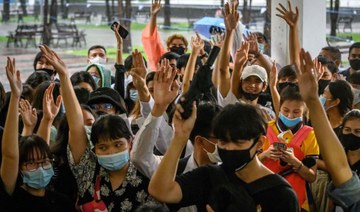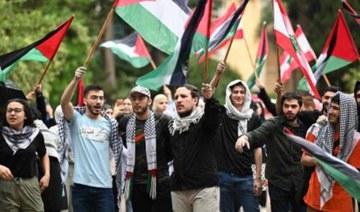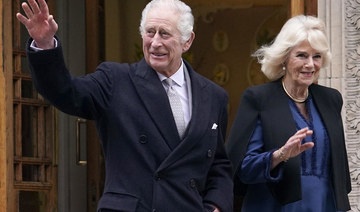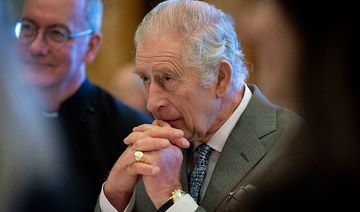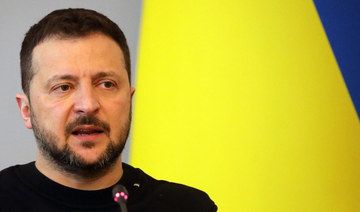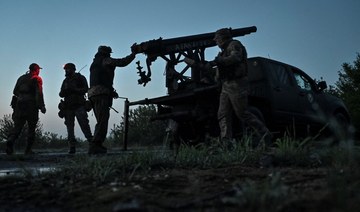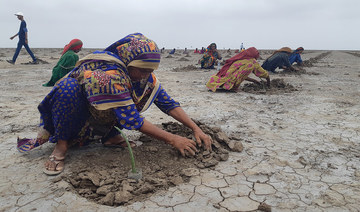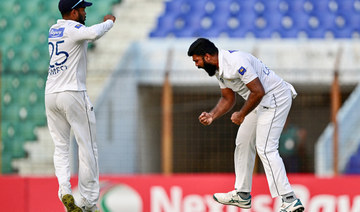BANGKOK: Pro-democracy protesters took to the streets of Bangkok Saturday as a rally expected to draw tens of thousands of people kicked off calling for PM Prayut Chan-O-Cha to step down and demanding reforms to the monarchy.
Thailand has seen near-daily gatherings of youth-led groups since mid-July demanding the resignation of Prayut, the former army chief behind the 2014 coup, and a complete overhaul of his administration.
Some are also demanding reforms to the kingdom’s ultra-wealthy and powerful monarchy — a once-taboo topic in Thailand due to its tough royal defamation laws.
The burgeoning movement, partly inspired by Hong Kong’s pro-democracy protests, remains largely leaderless.
But the weekend’s demonstration is organized by students of Bangkok’s Thammasat University — a group that has been among the most vocal about the royal family’s role in Thailand.
A crowd of several hundred gathered before noon at the locked gates of the university, demanding to be let in. Protesters chanted “Down with dictatorship, long live democracy!” and “Prayut get out!”
“If you don’t open, we will break in,” protesters yelled, before forcing the gates open — despite student leaders calling for calm — allowing hundreds to flow into the campus.
The demonstration was later expected to move on to the historic Sanam Luang field in front of the royal palace, where protesters plan to spend the night.
“We are fighting for more democracy,” prominent student activist Panusaya Sithijirawattanakul said on the eve of the protest.
“The plan is not to destroy the monarchy but to modernize it, to adapt it to our society.”
On Sunday, demonstrators are expected to march to the nearby Government House — a move authorities have warned against.
The show of force is expected to be the largest since the 2014 coup — student activists are hoping for a turnout of more than 50,000 supporters.
Police said some 10,000 officers would be deployed around the area.
A cycle of violent protests and coups has long plagued Thailand, with the arch-royalist military stepping in to stage more than a dozen putsches since the end of royal absolutism in 1932.
The latest wave of student-led demonstrations has largely been peaceful.
But unprecedented calls from some protesters for frank discussions about the monarchy have sent shockwaves through the kingdom.
King Maha Vajiralongkorn sits at the apex of Thai power, buttressed by the kingdom’s military and billionaire clans, and commands a fortune estimated to be worth up to $60 billion.
The student demands include greater accounting of the palace’s finances, the abolition of royal defamation laws and a call for the king to remain outside of politics.
They also want a rewrite of the 2017 military-scripted constitution, which they say tilted last year’s election in Prayut’s favor, and for the government to stop “harassing” political opponents.
So far, authorities have arrested more than two dozen activists, charging them with sedition before releasing them on bail.
The weekend demonstrations will prove a test for the pro-democracy movement, analysts say, which has gained momentum online thanks to the students’ savvy use of social media.
“A critical mass would send a clear message that the protesters are a force to be reckoned with,” said Thitinan Pongsudhirak of Chulalongkorn University.
Prayut has warned Thailand could be “engulfed in flames” if the movement goes too far.
But he vowed authorities would use “soft measures” on the protesters “because they are children.”
The top-trending hashtag on Thai Twitter late Friday was “Sept 19, we take back the power of the people.”
Around the world, Thais are expected to gather in solidarity, with weekend protests planned in a dozen countries, including Germany, Australia and the United States.
Thai protesters kick off weekend of rallies
https://arab.news/rshqt
Thai protesters kick off weekend of rallies
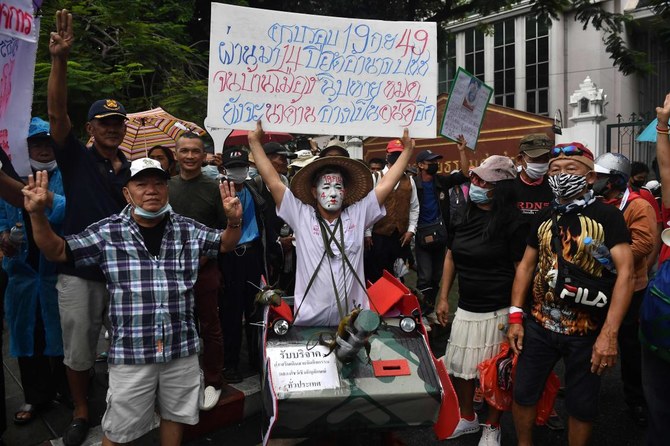
- Thailand has seen near-daily gatherings of youth-led groups since mid-July
- Some are also demanding reforms to the kingdom’s ultra-wealthy and powerful monarchy
Greek court drops criminal charges against 35 international aid workers
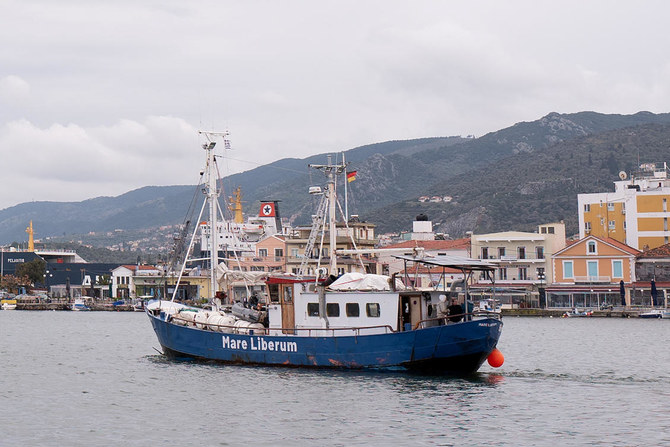
Greece was on the front line of a huge surge of refugees and migrants to Europe in 2015 and 2016
ATHENS: Greece has dropped criminal charges against dozens of international aid workers, ranging from spying to facilitating what authorities had called illegal entry into the country through the island of Lesbos, court documents showed on Tuesday.
Most of the 35 people, accused in 2020 of setting up a criminal organization and providing support to traffickers ferrying migrants, were German nationals. The rest included people from Norway, Austria, France, Spain, Switzerland and Bulgaria. They were arrested and had denied wrongdoing at the time.
The case was dropped due to inadequate evidence, the documents seen by Reuters showed.
“The detailed investigation of the case file has resoundingly quashed the police narrative which was pure fiction,” said Zaharias Kesses, a lawyer representing some of the aid workers.
Greece was on the front line of a huge surge of refugees and migrants to Europe in 2015 and 2016, many through its outlying islands close to Turkiye, including Lesbos. That flow has since ebbed.
The case was based on a 2020 operation by the Greek intelligence service EYP and the anti-terrorism unit with the code name Alkmini, and involved undercover agents who traveled as migrants from Turkiye to Lesbos.
Greek intelligence services were initially involved because the workers, who were using an alarm phone for migrants and asylum seekers in need of rescue at sea, were thought to have passed on information on Greek coast guard movements and vessel equipment.
But a magistrate’s investigation concluded the information and visual material collected were not confidential.
“There is not enough evidence to support the accusations against the defendants,” the documents said.
Top French university loses funding over pro-Palestinian protests
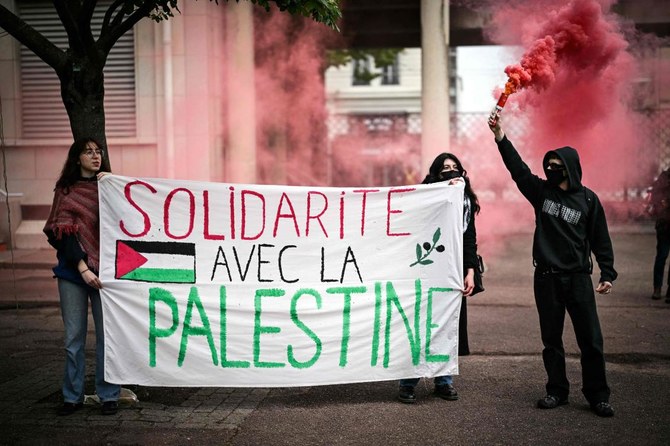
- Regional support for the Paris-based university includes 1 million euros earmarked for 2024
- The university’s acting administrator, Jean Basseres, said he regretted the decision
PARIS: The Paris region authority sparked controversy Tuesday by temporarily suspending funding for Sciences Po, one of the country’s most prestigious universities, after it was rocked by tense pro-Palestinian demonstrations.
“I have decided to suspend all regional funding for Sciences Po until calm and security have been restored at the school,” Valerie Pecresse, the right-wing head of the greater Paris Ile-de-France region, said on social media on Monday.
She took aim at “a minority of radicalized people calling for anti-Semitic hatred” and accused hard-left politicians of seeking to exploit the tensions.
Regional support for the Paris-based university includes 1 million euros earmarked for 2024, a member of Pecresse’s team told AFP.
On Tuesday, the university’s acting administrator, Jean Basseres, said he regretted the decision.
“The Ile-de-France region is an essential partner of Sciences Po, and I wish to maintain dialogue on the position expressed by Mrs.Pecresse,” he told French daily Le Monde in an interview published Tuesday.
In an echo of tense demonstrations rocking many top US universities, students at Sciences Po have staged a number of protests, with some students furious over the Israel-Hamas war and ensuing humanitarian crisis in the besieged Palestinian territory of Gaza.
France is home to the world’s largest Jewish population after Israel and the United States, as well as Europe’s biggest Muslim community.
University officials called in police to clear a protest last week. On Monday, police broke up a student protest demanding an end to Israel’s bombardment of Gaza at Sorbonne, another top French university.
Higher Education Minister Sylvie Retailleau said on Tuesday the French government had no plans to suspend funding for Sciences Po.
Speaking to broadcaster France 2, she estimated the state’s funding for the university at 75 million euros. She said there had been “no anti-Semitic remarks” and no violence had been committed during the demonstrations.
Both Basseres and Retailleau also said there were no plans to suspend Sciences Po’s collaboration with universities in Israel.
Critics on the left have denounced Pecresse’s announcement.
“It’s shameful and an absolute scandal,” said Mathilde Panot, the head of hard-left France Unbowed (LFI) deputies in parliament, adding the behavior of the students was a “credit to the world and a credit to our country.”
Panot and Rima Hassan, a Franco-Palestinian activist who is running on the LFI list for European elections, were on Tuesday questioned in an investigation into suspected justification of “terrorism” over comments on the October 7 attack by Hamas on Israel.
Several hundred people staged a solidarity rally in support of the two women on Tuesday morning.
“In what democracy are counter-terrorism methods used against political activists, community activists and trade unionists?” Panot, 35, told her supporters, who chanted “Resistance” and waved Palestinian flags.
“I want to tell the pro-Israeli lobby organizations behind these complaints that they will not silence us,” added 32-year-old Hassan.
The war started after Hamas’s October 7 attack on southern Israel resulted in the deaths of 1,170 people, mostly civilians, according to an AFP tally of Israeli official figures.
Israel’s retaliatory offensive has killed at least 34,535 people in Gaza, mostly women and children, according to the health ministry in the Hamas-run territory.
Palestinian militants also took some 250 hostages on October 7. Israel estimates 129 remain in Gaza, including 34 believed to be dead.
King Charles III resumes public duties as he fights cancer
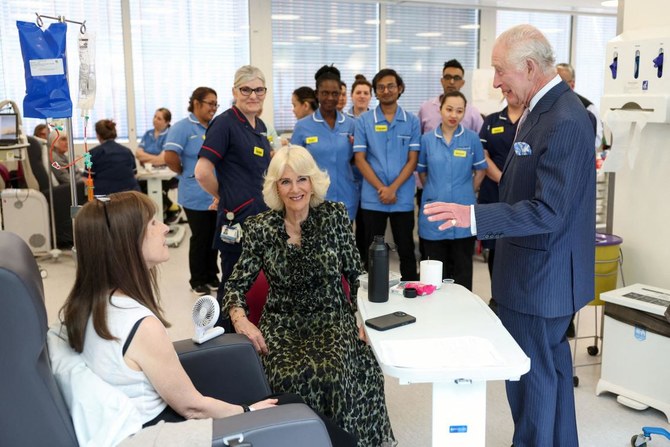
- The British head of state appeared relaxed as he and his wife Queen Camilla met patients and staff at the University College Hospital Macmillan Cancer Center
- He talked to patients receiving chemotherapy at a day unit
LONDON: King Charles III on Tuesday reportedly told fellow cancer patients “I’m well,” as he carried out his first official public engagement since being diagnosed with the condition.
The British head of state appeared relaxed as he and his wife Queen Camilla met patients and staff at the University College Hospital Macmillan Cancer Center in central London.
He talked to patients receiving chemotherapy at a day unit, including 60-year-old Asha Millen, who has bone marrow cancer.
“I said, ‘How are you?’ and he said, ‘I’m well’,” she told reporters afterwards.
Another patient, Lesley Woodbridge, 63, said the king sympathized with her, and added: “I’ve got to have my treatment this afternoon as well.”
Charles, 75, suspended most of his duties in February after cancer was found while he was being treated for an enlarged prostate the previous month.
The exact nature of his cancer has not been disclosed but doctors said last week they were “very encouraged” by the progress of his treatment as an out-patient and “positive” about his recovery.
His daughter-in-law Catherine, Princess of Wales, 42, underwent abdominal surgery in January and said in March that she was receiving chemotherapy.
Again, no details were given about what type of cancer she has. Kate, as she is widely known, is married to Charles’s elder son and heir Prince William.
Tuesday’s event was the first in a number of planned engagements in the coming weeks and designed to raise awareness of the importance of early cancer diagnosis and highlight innovative research, Buckingham Palace said.
Charles, who succeeded his mother Queen Elizabeth II in September 2022, was officially crowned king on May 6 last year.
He has been seen attending church services since his diagnosis and at selected audiences. He has also continued his official state business.
His treatment will continue but his schedule in the coming weeks will be reduced and subject to medical advice, a spokesperson added.
His engagements will include a state visit by Emperor Naruhito and Empress Masako of Japan in June.
The chief executive of University College London Hospitals group, David Probert, said Charles “deliberately went out of his way to meet as many staff and patients as he could.”
Patients were “delighted” to see him, he told Sky News, and described the visit as “incredibly uplifting.”
Members of the public last week welcomed the king’s return to some duties, praising him for raising awareness about cancer, which will affect one in two people, according to Cancer Research UK.
Probert said the king’s announcement had led to a surge in people looking up symptoms and seeking out treatment.
“It’s a huge issue in today’s society,” Keegan Gray, 23, a demolitions manager from New Zealand, told AFP on Friday.
“A lot of people have cancer and a lot of people they keep it to themselves, they’re a bit shy about it,” he added after the news Charles would resume some public duties.
Gray said it was “really beautiful” that the king was raising awareness of cancer and the work of treatment clinics.
Charles and Kate’s cancer diagnoses have created a headache for the royal family, with both having postponed public engagements.
William has also taken a step back to support his wife and their three young children, leaving fewer senior royals to fill the schedule.
Camilla, 76, has stepped in to take over many of her husband’s engagements. Charles’s sister Princess Anne and his youngest brother Prince Edward have also taken on more prominent roles.
Charles’s largely estranged younger son, Prince Harry, is no longer a working royal but is expected in London on May 8 to mark the 10th anniversary of his Invictus Games for disabled military veterans.
He will then join his American wife Meghan on a visit to Nigeria.
Russia says shot down US-made missiles launched by Ukraine
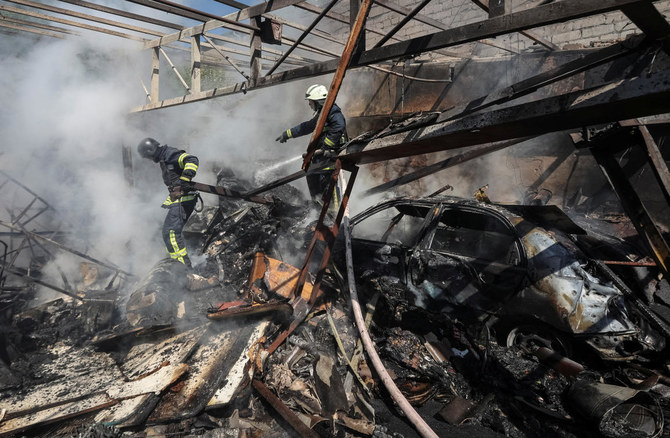
- Washington has said it had supplied the arms to Ukraine
- The Russian-installed head of Crimea, Sergei Aksyonov, said one of the missiles was downed in the village of Donskoye
MOSCOW: Russia said Tuesday it had shot down six US-supplied tactical missiles launched by Ukraine, with officials in annexed Crimea saying some were downed over the Black Sea peninsula.
Washington has said it had supplied the arms to Ukraine, which has been asking for more powerful weapons for months as it struggles to contain advancing Russian forces.
Moscow’s defense ministry said it had destroyed six Army Tactical Missile System (ATACMS) rockets “in the last 24 hours,” without saying where they were shot down.
The Russian-installed head of Crimea, Sergei Aksyonov, said one of the missiles was downed in the village of Donskoye, outside the main city of Simferopol.
“After an ATACMS missile was shot down, undetonated submunitions scattered,” Aksyonov said on Telegram.
“If you find such a weapon, do not pick it up or come close and call emergency services or the police,” he warned.
Aksyonov posted a photograph of a metal ball which he said was part of the destroyed missile.
Russia did not say if the missiles caused any damage in Crimea.
Earlier, an official from Russian-occupied southern Ukraine, Vladimir Rogov, said that air defense had been in operation over Simferopol and the town of Dzankoi, in northern Crimea.
Ukraine has regularly attacked Crimea during Moscow’s more than two-year offensive.
But it did not comment on Tuesday’s attack.
Last week, the United States said it had sent ATACMS missiles to Ukraine in February.
Ukrainian forces are now awaiting the arrival of new US weapons, green-lighted by President Joe Biden after months of being blocked by political wrangling in Congress.
Sri Lanka joins Global South-North dialogue through Riyadh WEF meeting
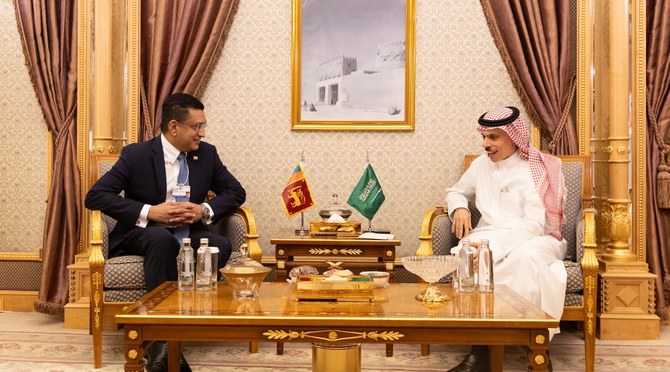
- Foreign Minister Ali Sabry was among the special meeting’s speakers
- He represented the Global South perspective at the invitation of Saudi FM
COLOMBO: Sri Lanka is trying to position itself in the dialogue between the Global South and North, its foreign minister said, following the World Economic Forum’s special meeting on global collaboration organized by Saudi Arabia.
The WEF’s Special Meeting on Global Collaboration, Growth and Energy for Development convened 1,000 global leaders arriving in Riyadh from 92 countries on April 28-29 to find actionable, collaborative and sustainable solutions to shared challenges.
The meeting saw a focus on the Global South, or countries, mostly in the Southern Hemisphere and largely in Africa, Asia and Latin America, which until recently have often been described as developing or less developed.
Sri Lanka FM Ali Sabry represented the Global South perspective at the forum’s session titled “North to South, East to West: Rebuilding Trust” alongside his Saudi counterpart, Prince Faisal bin Farhan.
“It was a great opportunity for me to showcase Sri Lanka and the challenges that countries in the Global South face, and also to position Sri Lanka as an important player, particularly in the Global South in shaping the future … for collaboration, peace and stability, rather than confrontation,” he told Arab News.
The minister was in Riyadh at the invitation of Prince Faisal, with whom he also held a meeting.
“We look forward to elevating the partnership,” Sabry said.
“We intend to sign the investment protection agreement that would probably pave the way for the inflow of investment into Sri Lanka.”
He also met other Saudi leaders during his visit to explore further cooperation possibilities.
The Kingdom has expanded ties with the South Asian island nation since last year, agreeing to broaden political consultation and launching a new employment scheme aimed at boosting Sri Lanka’s manpower exports.
Colombo has since sought Saudi assistance in developing several of its key sectors, including tourism and agriculture.



